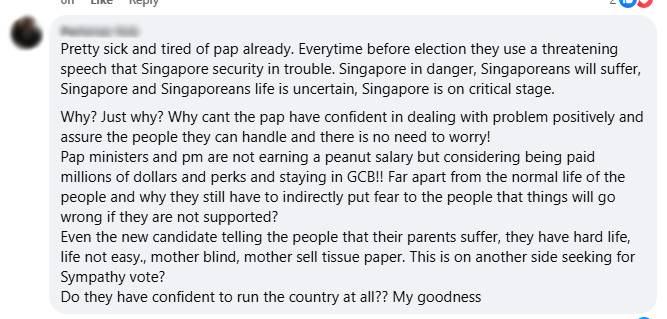SINGAPORE: Netizens have accused Home Affairs and Law Minister K. Shanmugam of fearmongering after he warned that Singapore’s economy and national security could be at risk due to US tariffs and a breakdown in the global trading system.
Many viewed his remarks as a familiar tactic used ahead of elections to instil fear and rally support for the ruling party.
Speaking at the Home Team Promotion Ceremony on 17 April, Shanmugam expressed concern that global trade tensions—particularly those triggered by the United States—could threaten not only the global economy but also international and domestic security.
He warned that the shift away from a rules-based trading system would force countries to prioritise self-reliance, increasing the risk of instability.
Shanmugam’s remarks came shortly after former US President Donald Trump’s announcement of sweeping tariffs on trading partners, including a baseline 10 per cent tariff on all imports into the US.
“We don’t know whether the world, as we know it, is gone permanently, or whether Trump will have a change of heart,” Shanmugam said.
“But it is going to be a very difficult environment. Inevitably, big countries will start giving incentives and putting up more barriers—because when the US does it, others have to do it too.”
He added that Prime Minister Lawrence Wong and like-minded leaders from other nations are currently working to stabilise the global trading system.
“Some order is better than no order,” he said, referencing PM Wong’s remarks at the 14th S. Rajaratnam Lecture on 16 April.
Shanmugam also linked these economic concerns to potential security implications, warning that job losses and financial stress could increase the risk of crime and public disorder.
“Economic vibrancy could be affected. Jobs are likely to be lost, including in Singapore. This is tailor-made for an increase in crime,” he said.
As a trade-dependent nation, Singapore may be more vulnerable than other countries, he cautioned, with significant implications for tax revenues, government budgets, and the delivery of public services such as healthcare and social support.
“Our ability to collect taxes, fund programmes, and maintain healthcare and other social spending will come under pressure,” Shanmugam added.
“There are therefore wider implications for the international order and direct implications for national security.”
Despite the grim outlook, Shanmugam expressed confidence in the Home Team’s readiness to respond.
“We can prepare our officers to deal with the challenges if they come. And I have every confidence that you will continue to lead the Home Team well,” he said.
IMF Rejects Recession Alarm, Urges Global Cooperation
Shanmugam’s warnings stood in stark contrast to comments made by International Monetary Fund (IMF) Managing Director Kristalina Georgieva, who addressed the issue on the same day in Washington.
Speaking ahead of the IMF and World Bank Spring Meetings, Georgieva acknowledged that global trade uncertainty was “literally off the charts” due to the new tariffs.
However, she rejected fears of an imminent global recession.
While the IMF is expected to downgrade its global growth forecast in its 22 April World Economic Outlook, Georgieva said the global economy remains resilient due to strong fundamentals and policy adaptability across many nations.
She noted that heightened trade tensions could suppress investment, reduce growth, and damage long-term productivity—particularly in small, open economies.
But she emphasised that perceptions matter as much as reality and called on governments to communicate clearly to maintain public confidence.
“In trade policy, the goal must be to secure a settlement among the largest players that preserves openness and delivers a more level playing field,” she said.
Despite the turbulence, she expressed optimism that current challenges present an opportunity to build a more resilient and better-balanced global economy.
Public Pushback: Netizens Decry ‘Fearmongering’
Under the Straits Times’ Facebook post on his remarks, numerous netizens accused the government of fearmongering, especially with elections looming.
Commenters expressed frustration at what they saw as a recurring pattern of the PAP invoking threats to national security and economic collapse before elections.
Some accused the ruling party of using fear to manipulate voters, rather than offering reassurance or meaningful solutions.



One user expressed frustration over the ruling party’s habit of using threatening speeches before elections, claiming that Singapore’s security is in trouble and that Singaporeans will suffer.
The user questioned why the PAP cannot have confidence in handling problems positively and assure the people that there is no need to worry.
“Why do they still have to indirectly put fear to the people by saying that things will go wrong if they are not supported?”

Another user remarked that ministers were seizing the opportunity to capitalise on the US tariff issue and use scare tactics to earn votes as the General Election approaches.
They criticised the government for using its authority as a platform to perpetuate its regime, stating that true leaders do not rely on fearmongering to gain support.

Calls for Action Over Fearmongering
Other commenters stated that instead of fearmongering, they wanted solutions, arguing that the government should focus on tangible action to address ongoing domestic issues.
They criticised the reliance on external threats instead of tackling key challenges such as GST hikes, immigration, and rising prices.


One commenter noted that long before these tariffs were introduced by Trump, people in Singapore had already been dealing with a steady rise in the cost of living through multiple channels, such as increased GST, higher utility bills, and rising food and transport costs.
They argued that blaming external factors only distracts from the deeper, ongoing issues at home.
The commenter further stated that the Singapore government should stop using Trump’s policies as fear tactics to avoid accountability and manipulate public sentiment ahead of the General Election to secure votes for the ruling party.

The post Netizens accuse K Shanmugam of fearmongering over US tariffs warning appeared first on The Online Citizen.


